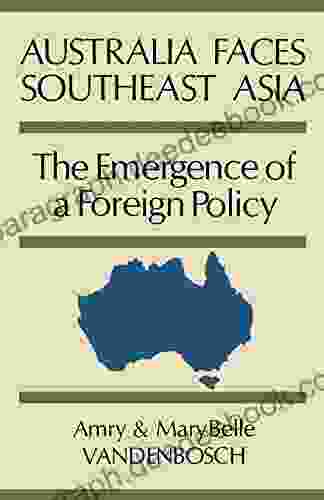The Emergence of Foreign Policy

4 out of 5
| Language | : | English |
| File size | : | 778 KB |
| Text-to-Speech | : | Enabled |
| Enhanced typesetting | : | Enabled |
| Word Wise | : | Enabled |
| Print length | : | 183 pages |
| Screen Reader | : | Supported |
| X-Ray for textbooks | : | Enabled |
Foreign policy is the set of principles and strategies that guide a nation's interactions with other countries. It is a complex and dynamic field that has evolved over centuries, shaped by a variety of factors including the rise of nation-states, the growth of international trade and communication, and the increasing complexity of global affairs.
In this article, we will explore the emergence of foreign policy as a distinct field of study and practice. We will trace its roots from ancient times to the present day, and examine the key factors that have influenced its development. We will also discuss the challenges and opportunities facing foreign policy in the 21st century, as the world becomes increasingly interconnected and interdependent.
The Roots of Foreign Policy
The origins of foreign policy can be traced back to ancient times, when rulers and empires sought to protect their interests and expand their power through diplomacy, war, and trade. In the ancient world, foreign policy was often closely tied to religion and ideology, as rulers sought to مشروع their values and beliefs on other peoples.
One of the earliest examples of foreign policy is the foreign policy of the ancient Egyptians. The Egyptians were a highly centralized state with a strong military, and they used their power to expand their empire and control trade routes. The Egyptians also developed a sophisticated system of diplomacy, which they used to build alliances with other states and to secure their borders.
Another early example of foreign policy is the foreign policy of the ancient Greeks. The Greeks were a decentralized state, and their foreign policy was often determined by the individual city-states. The Greeks were skilled diplomats and traders, and they established a network of trading posts and alliances throughout the Mediterranean region.
The Romans also developed a sophisticated foreign policy. The Romans were a powerful military state, and they used their power to conquer and control a vast empire. The Romans also developed a system of law and administration that was used to govern their empire.
The Rise of Nation-States
The rise of nation-states in the 15th and 16th centuries marked a watershed moment in the development of foreign policy. Nation-states were centralized states with defined borders and a monopoly on the use of force within their territory. This gave nation-states the power to pursue their own independent foreign policies.
The rise of nation-states also led to the development of a new system of international law. This system of law was based on the principle of sovereignty, which held that each nation-state was independent and equal. This principle of sovereignty became the foundation of modern foreign policy.
The Growth of International Trade and Communication
The growth of international trade and communication in the 19th and 20th centuries had a profound impact on foreign policy. International trade created new economic incentives for cooperation between states, and it also led to the growth of international organizations such as the World Trade Organization (WTO).
The growth of communication technology also made it easier for states to communicate with each other and to coordinate their policies. This led to the development of new forms of diplomacy, such as summit meetings and international conferences.
The Increasing Complexity of Global Affairs
The 20th century saw a dramatic increase in the complexity of global affairs. This was due to a number of factors, including the rise of new technologies, the spread of democracy, and the growth of global interdependence.
These factors have made it more difficult for states to pursue their own independent foreign policies. States are now more interconnected and interdependent than ever before, and they must take into account the interests of other states when making foreign policy decisions.
The Challenges and Opportunities of Foreign Policy in the 21st Century
The 21st century poses a number of challenges and opportunities for foreign policy. One of the biggest challenges is the threat of global terrorism. Terrorism is a transnational threat that can affect any state, regardless of its size or location. States must cooperate with each other to combat terrorism and to protect their citizens.
Another challenge facing foreign policy in the 21st century is the rise of climate change. Climate change is a global threat that requires cooperation between states to address. States must work together to reduce greenhouse gas emissions and to adapt to the effects of climate change.
In addition to these challenges, the 21st century also offers a number of opportunities for foreign policy. One of the biggest opportunities is the rise of globalization. Globalization is the process of increasing interconnectedness and interdependence between states. Globalization can create new opportunities for cooperation and development. States can work together to promote economic growth, reduce poverty, and protect the environment.
Foreign policy is a complex and dynamic field that has evolved over centuries. It has been shaped by a variety of factors, including the rise of nation-states, the growth of international trade and communication, and the increasing complexity of global affairs.
In the 21st century, foreign policy faces a number of challenges and opportunities. States must cooperate with each other to combat terrorism, address climate change, and promote globalization. By working together, states can create a more peaceful, prosperous, and just world.
4 out of 5
| Language | : | English |
| File size | : | 778 KB |
| Text-to-Speech | : | Enabled |
| Enhanced typesetting | : | Enabled |
| Word Wise | : | Enabled |
| Print length | : | 183 pages |
| Screen Reader | : | Supported |
| X-Ray for textbooks | : | Enabled |
Do you want to contribute by writing guest posts on this blog?
Please contact us and send us a resume of previous articles that you have written.
 Novel
Novel Text
Text Story
Story Genre
Genre Reader
Reader Paperback
Paperback E-book
E-book Newspaper
Newspaper Paragraph
Paragraph Bookmark
Bookmark Foreword
Foreword Preface
Preface Annotation
Annotation Footnote
Footnote Manuscript
Manuscript Scroll
Scroll Codex
Codex Tome
Tome Memoir
Memoir Reference
Reference Dictionary
Dictionary Narrator
Narrator Character
Character Resolution
Resolution Librarian
Librarian Catalog
Catalog Card Catalog
Card Catalog Borrowing
Borrowing Archives
Archives Research
Research Scholarly
Scholarly Lending
Lending Reserve
Reserve Reading Room
Reading Room Rare Books
Rare Books Special Collections
Special Collections Interlibrary
Interlibrary Awards
Awards Reading List
Reading List Textbooks
Textbooks Chloe Timperley
Chloe Timperley Stephen Budiansky
Stephen Budiansky S H Wood
S H Wood Mac Barnett
Mac Barnett Holly Chase
Holly Chase Katharine Beals
Katharine Beals Bryan Oliver
Bryan Oliver Sarah Jane Stratford
Sarah Jane Stratford Bethany C Morrow
Bethany C Morrow Mark Aldrich
Mark Aldrich Matthew Zapruder
Matthew Zapruder Elaine L Galit
Elaine L Galit Maddy Court
Maddy Court Dan Gutman
Dan Gutman Mike Michalowicz
Mike Michalowicz Jen Malone
Jen Malone Barb Wardius
Barb Wardius Jared Sparks
Jared Sparks Mark Pendergrast
Mark Pendergrast Bob Seger
Bob Seger
Light bulbAdvertise smarter! Our strategic ad space ensures maximum exposure. Reserve your spot today!

 Braden WardThe Rosie Result: Don Tillman's Journey into Fatherhood and the Complexities...
Braden WardThe Rosie Result: Don Tillman's Journey into Fatherhood and the Complexities... Jarrett BlairFollow ·6.9k
Jarrett BlairFollow ·6.9k Javier BellFollow ·19.2k
Javier BellFollow ·19.2k Simon MitchellFollow ·7.3k
Simon MitchellFollow ·7.3k Jeffery BellFollow ·16.4k
Jeffery BellFollow ·16.4k Clark CampbellFollow ·17.6k
Clark CampbellFollow ·17.6k H.G. WellsFollow ·15.3k
H.G. WellsFollow ·15.3k Tom HayesFollow ·5.7k
Tom HayesFollow ·5.7k Glenn HayesFollow ·6.6k
Glenn HayesFollow ·6.6k

 Ricky Bell
Ricky BellThe Marriage: An Absolutely Jaw-Dropping Psychological...
In the realm of...

 Ray Blair
Ray BlairDiscover the Enchanting Charm of Budapest and Its...
Nestled in the heart of...

 Tyrone Powell
Tyrone PowellHuddle: How Women Unlock Their Collective Power
Huddle is a global movement that empowers...

 Grayson Bell
Grayson BellThe Coin Story of the Holocaust: A Symbol of Hope and...
In the depths of the...

 Virginia Woolf
Virginia WoolfFolklore Performance and Identity in Cuzco, Peru: A...
Nestled amidst...

 Dylan Mitchell
Dylan MitchellThe Enduring Love Story of Héloïse and Abélard: A Tale of...
An Intellectual Passion In the heart of...
4 out of 5
| Language | : | English |
| File size | : | 778 KB |
| Text-to-Speech | : | Enabled |
| Enhanced typesetting | : | Enabled |
| Word Wise | : | Enabled |
| Print length | : | 183 pages |
| Screen Reader | : | Supported |
| X-Ray for textbooks | : | Enabled |










